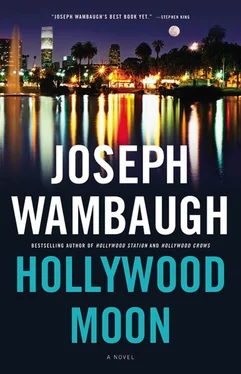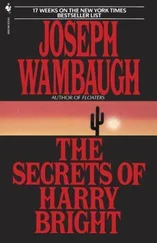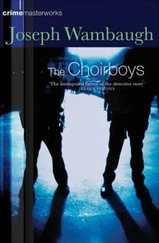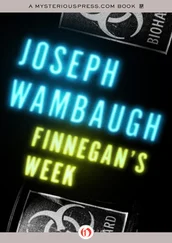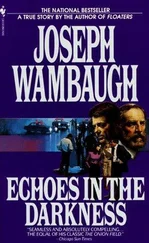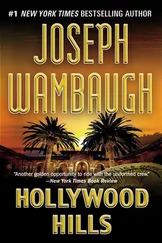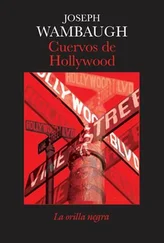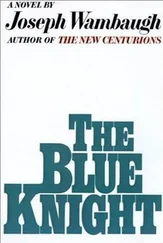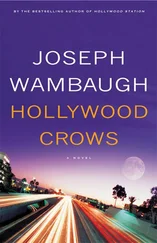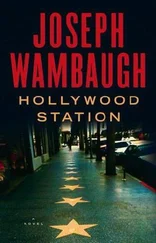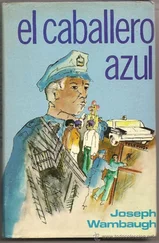“So who were you on that one, Jakob Kessler?”
“No, I think I was the Jew, Felix Cohen, then. I hadn’t created Jakob Kessler yet.”
“You should uncreate him,” she said. “That German accent sounds phony.”
“It sounds just like Arnold!” Dewey said. “It’s an Austrian’s German accent.”
“It sounds phony on Arnold too,” she said. “And that cotton you stuff in your cheeks doesn’t make you look like the Godfather. It makes you look like a man with a mouthful of disgusting food he can’t swallow. Kill the Kraut like you killed the Hebe. Stick with American characters. You’re not actor enough to pull off the accents.”
His jaws clenched and he said, “I can’t do it till I use up the new guys, Creole and Jerzy. They only know me as Kessler.”
“By the way, what happened to the old Polish guy that got pinched in Santa Monica?”
“That’s Old Jerzy,” Dewey said. “He was a parolee. Probably sent back to Pelican Bay or wherever. I use his memory to keep the new team in line.” With a bit of pride in his voice, he said, “They think scary Jakob Kessler had Old Jerzy eliminated because he got greedy. I used some imagination on that one.”
With her iguana smile: “Imagination? That’s so goddamn lame, Dewey. It’s the reason you failed as a screenwriter and as an actor. Kessler’s a walking cliché. Why don’t you face your limitations and concentrate on something you can do?”
Eyes moistening, Dewey said, “You can pull the guts right out of a man sometimes! I put in a ten-hour day already!”
“I put in twelve hours already,” she said. “And you got problems with relationships, take it up with Dear Abby.”
Malcolm Rojas wondered why he’d told young Naomi Teller that his name was Clark. He didn’t have a conscious reason to lie to her, and yet he had. Something deep inside him made him do that, and he didn’t quite understand it. There were lots of things about himself that he did not understand lately, lots of things that he had to do and did not know why. For instance, he did not consciously understand why he’d taken the box cutter home today from his job opening cardboard boxes at the massive home improvement center on Victory Boulevard in the San Fernando Valley. It wasn’t for protection. Since he and his mother had moved to the apartment building a few blocks west of Highland Avenue, he’d felt very safe. He’d never felt safe when they lived in Boyle Heights, not in the middle of Latino gang turf, where he’d been raised until a year earlier, when he’d finished high school and got the job at the shopping center, far from Boyle Heights.
Malcolm Rojas didn’t know why he’d pulled over and parked his red fifteen-year-old Mustang when he’d seen Naomi Teller on the street. Couldn’t fathom why he’d gotten out and followed her and stopped her to talk. She didn’t really appeal to him. She was too young, too skinny. She wasn’t his type at all. Why did he say he’d call her? There were many conflicting emotions roiling inside him as he drove north on Highland Avenue toward Hollywood High School.
He parked and looked at the place. Why couldn’t he have gone to high school there? Why did his father keep him and his mother all those years in a shitty house in Boyle Heights so his father could be close to his shitty job at the scrap yard? That wasn’t reason enough. Malcolm had always been frightened there, of tattooed gang members, of barrio life in general, especially with a mother who was a very white American and who didn’t understand more than a few words of Spanish. He’d felt like an outsider and had stayed home a lot with her, paying the price for it when he had to endure the names the other kids called him at school, especially after they found out that Malcolm’s father was Honduran, not Mexican like theirs. One of the names they’d called him was Li’l Hondoo, and he hated it. He hated all those cholo bastards.
Malcolm well remembered the conflicting emotions he’d felt when his father had been fatally injured at work after a drunken crane operator dropped a mangled Ford station wagon on top of him and another worker. A local attorney had contacted his mother, and because of the gross negligence of the company, she ended up with a $400,000 settlement, which allowed them to move away from the barrio and into a modest apartment in Hollywood. The move made him feel that at last he was home.
As a baby he’d been christened Ruben after his father. His middle name was Malcolm, the name of his maternal grandfather, who’d died before the boy was born. Early in life, young Ruben had decided that he wasn’t Honduran like his father, even though he knew how very much he looked like the man. After his father’s death, young Ruben Rojas came to hate his Hispanic name and insisted that his mother call him Malcolm in honor of her late father. She always indulged her only child’s whims, but it was hard for her even now to remember that he was Malcolm and not Ruben.
When she’d get drunk, his mother would endlessly repeat the story of how she’d first arrived in L.A. from Tulsa and moved into a hotel apartment near downtown. The man who would become Malcolm’s father was her neighbor. She’d laugh when telling Malcolm how she didn’t even know where Honduras was but believed it to be somewhere near Spain. Her handsome Honduran neighbor had an old car, and he would drive her to various cafeterias that were hiring waitresses and was always kind to her, and eventually they fell in love.
Malcolm hated those stories and tried to ignore them, and he hated being anything like his father. Malcolm was from his mother’s womb, so he was his mother’s son, and she was white and blue-eyed and blonde and…
Suddenly he was angry, very angry, for no reason at all. The bouts of anger had begun when he was about thirteen years old and had grown gradually over the past six years. He’d never talked to anyone about it, especially not to his mother. Once he thought about talking to a counselor at school but changed his mind. It was far better to work things out on your own, he decided. Why not? He’d been a loner all his life. Sometimes he could quell the anger by masturbating, but he didn’t feel like doing that now.
He started the Mustang again and began driving. The sun had set and the mauve and persimmon sky over Hollywood was turning dark. He took one hand from the steering wheel and held it in front of him. The hand was shaking for no reason at all. He didn’t even know what street he was on now, but there were apartment buildings on both sides. Three of them had parking garages down below and electric security gates that could be opened by the residents as they drove inside. He remembered a TV movie where a contract killer waited outside such a building, hiding behind some bushes, and then followed a car inside to shoot the driver before escaping in the victim’s car.
He felt the anger growing, and his hands trembled more. His armpits were damp and he felt a bit light-headed, like when he’d sniffed glue back in middle school. He saw an apartment building that looked just like the one in the movie. There were even big clumps of bougainvillea growing beside the security gate that led to the underground parking. A contract killer could hide there, Malcolm thought. Just like in the movie.
NIGHT HAD FALLEN, and it was going to be a dark one, with low, hanging smog concealing the moon and stars. The residential street was adequately lighted, but the apartment building was situated in the middle of the line of streetlights and settled in deep shadow. The security lights on the front of the building were timed not to go on for another thirty minutes in order to save electricity. It was a quiet street, the only noise coming from the incessant traffic hum on Sunset Boulevard.
Читать дальше
